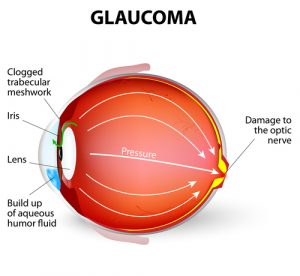Have you or a loved one recently received a glaucoma diagnosis? Glaucoma is one of the leading causes of blindness in adults over 60.
Developing glaucoma doesn’t necessarily mean going blind. Although glaucoma does not currently have a cure, it is manageable with several treatments.
But the reason that glaucoma is a leading cause of blindness is that it doesn’t present any signs or symptoms in the early stages of the eye condition. It only begins to display symptoms when it causes vision loss.
Vision loss due to glaucoma is irreversible. Any treatment will only slow down further vision loss and will not restore previously lost vision.
Because it doesn’t have symptoms until it’s already caused permanent vision loss, glaucoma is often called the silent thief of vision. Although glaucoma can sound daunting, it doesn’t have to mean the end of your ability to see.
With early diagnosis and treatment, patients can preserve more remaining vision. Keep reading to learn more about glaucoma, what causes it, and what it can do to your vision.
What is Glaucoma?

Glaucoma is the name given to a collection of diseases that all cause damage to the optic nerve. The optic nerve is what connects your eye to your brain.
When it becomes significantly damaged, the optic nerve cannot send all the information about what you’re seeing to your brain. The most common cause of glaucoma is high intraocular pressure or IOP.
The fluids in your eye, called aqueous humor, flow in and out of your eye to keep it clean and healthy. But when the channels it flows through become blocked off, the fluid builds up, putting pressure on the optic nerve.
Open-Angle Glaucoma
The most common kind of glaucoma is called open-angle glaucoma. The angle referred to is the primary drainage angle made by the channel between your cornea and iris.
In open-angle glaucoma, this channel is open. But the trabecular meshwork, a series of drainage channels made up of porous tissue surrounding the eye, becomes blocked, preventing proper drainage and building up IOP.
Angle-Closure Glaucoma
There are many other kinds of glaucoma, but they’re all much rarer. But the least rare, although still much more uncommon than open-angle glaucoma, is angle-closure glaucoma.
Angle-closure glaucoma occurs when the primary drainage angle between your iris and cornea becomes closed off by the iris bulging. Often, this happens suddenly, which is called acute angle-closure glaucoma.
Acute angle-closure glaucoma causes immediate and apparent symptoms. Acute angle-closure glaucoma is considered a medical emergency and requires immediate attention to prevent vision loss.
Glaucoma Symptoms
Open-angle glaucoma doesn’t present any symptoms at first. You won’t be able to feel the pressure building up in your eye.
It only shows symptoms once your optic nerve has become damaged enough that it causes vision loss. Damage to the optic nerve begins with your peripheral vision becoming blurry or blacking out entirely.

The further the condition progresses, the more your vision begins tunneling. Acute angle-closure glaucoma, however, does cause symptoms right away.
These symptoms include severe eye pain, blurred vision, headache, nausea, and vomiting. If you experience these symptoms, seek medical attention immediately.
Emergency treatment is required to relieve the pressure and prevent damage to the optic nerve. Remember that while it’s essential to be aware of angle-closure glaucoma, open-angle glaucoma is far more common.
But since it doesn’t show signs before it’s too late, how can you prevent vision loss? The only way is through regularly scheduled eye exams.
Prevention

You cannot prevent glaucoma. Certain factors put you at higher risk for glaucoma, like high blood pressure and diabetes, which you can reduce by generally leading a healthy lifestyle.
But you may also be at risk for glaucoma because of your family medical history, age, and ethnicity. You’re at higher risk for glaucoma if you’re of African American or Hispanic descent.
You’re also at increased risk for glaucoma if you’re over 60, regardless of other risk factors. But you can prevent vision loss from glaucoma by having it diagnosed in the early stages and treated.
The only way to do this is by having regular eye exams. You may not have any symptoms in the early stages of glaucoma, but your eye doctor can measure your IOP and tell if it’s elevated.
They can also examine your optic nerve for damage. If you’re at risk for glaucoma or any other age-related eye condition, it’s imperative to have regular eye exams.
Most eye doctors recommend having yearly eye exams by age 65. If you’re at higher risk for reasons other than your age, they may recommend you have annual eye exams even earlier.
If your glaucoma is diagnosed early, you can slow down the progress of the eye condition through a variety of different treatments.
Treatment

If your glaucoma is in the very early stages, or if you have high IOP but no optic nerve damage, the best treatment is often medicated eye drops. These eye drops lower your IOP. While drops can be very effective at lowering eye pressure, they are sometimes a burden to administer and financially costly.
Here at Williamson Eye Center, we are dedicated to providing our glaucoma patients with the best treatments available. That’s why we offer a range of minimally invasive glaucoma surgeries (MIGS) and now Durysta medication implants to deliver medication inside the eye. These treatments are aimed at reducing or potentially eliminating the need for costly and time consuming glaucoma drops by lowering eye pressure from inside the eye.
Your best protection against Glaucoma is having yearly eye exams to detect symptoms before vision loss occurs. When diagnosed early, you can more easily manage your glaucoma to prevent vision loss. Talk to your doctor about your risk for glaucoma and have regular eye exams based on their recommendations.
When you’re aware of your risk and take the proper steps to manage it and spot glaucoma early, you’ll be able to keep your vision for years to come. Learn more about how to keep glaucoma in check by scheduling an appointment at Williamson Eye Center in Baton Rouge, LA, now!



